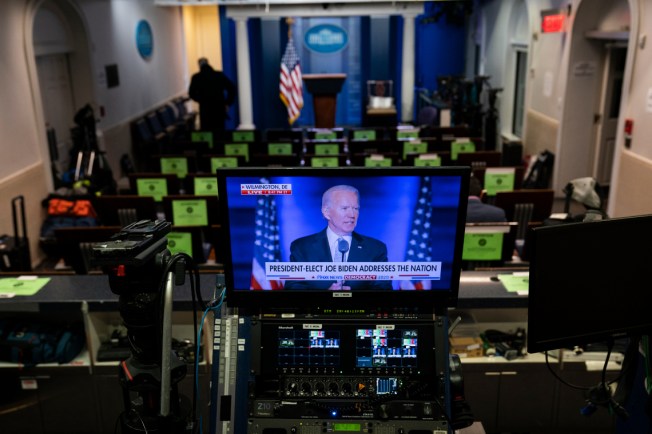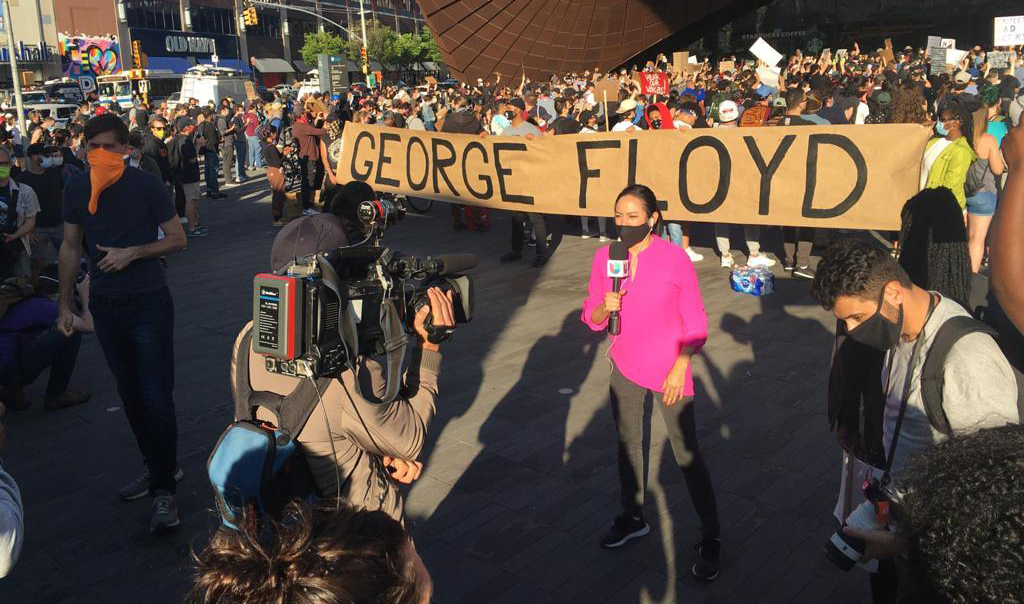CPJ urges incoming Biden administration to take specific steps to restore press freedom

President Donald Trump’s anti-press rhetoric over the past four years has had a dual effect: It has done extraordinary damage to public trust in the media in the United States, and it has simultaneously emboldened autocrats around the world to embrace his words, denounce critical journalists, and pass legislation that restricts press freedom.
It’s clear that President-elect Joe Biden has some work to do to restore U.S. press freedom leadership.
To help provide a roadmap for the incoming administration and ensure that the U.S. stands firmly with journalists, CPJ developed a white paper in consultation with nearly 40 journalists, lawyers, and philanthropists. The document highlights at least two steps the new president must take to confront these challenges: The Biden administration must improve press freedom in the United States, and it must make protection of press freedom an explicit focus of foreign policy. This can be done, CPJ Executive Director Joel Simon points out, by appointing a Special Presidential Envoy for Press Freedom who would represent the administration at a high level wherever journalists are under threat. The white paper also includes other recommendations to the administration.
CPJ is engaging with the Biden administration so we can stress the urgent need for press freedom to become a priority in the United States once again. The current “culture isn’t going to repair itself,” said media columnist Margaret Sullivan in The Washington Post earlier this month, “just because … [a] president has left office.”
Citing CPJ’s Simon in her column, Sullivan said that appointing a special presidential envoy for press freedom would enable Biden to send a loud, powerful message. “There’s a great opportunity here,” she wrote. “Biden should raise that low bar. Raise it high.”
A new set of challenges for journalists in 2020

The global COVID-19 pandemic posed the single greatest threat to journalists and press freedom around the world. Besides having to work doubly hard to keep themselves and their loved ones safe during the public health crisis, journalists all over the world faced additional restrictions on their reporting, placed by leaders reluctant to have their health data publicized. Governments began using the outbreak as a cover to implement new laws—suspending free speech, restricting access to information, and enacting even more laws against “fake news.”
CPJ mobilized our resources and began to do what we do best. As an organization of journalists, we knew we must document each violation and seek justice. We launched a campaign to free imprisoned journalists, given our concerns that they faced increased risks if they contracted the virus in prison. Our Emergencies team disseminated updated and timely information in 42 languages to journalists on ways to keep themselves safe while reporting on the virus, and we held online workshops and individual consultations with journalists and newsrooms to answer specific questions. We have helped hundreds of journalists this way and we continue to do so.
A few months after the pandemic began, George Floyd was killed in police custody in Minneapolis. His death sparked protests that spread all over the world. While the Black Lives Matter protests called for the end of systemic abuse, journalists covering the demonstrations became targets—mostly by police. To date, more than 960 press freedom violations have been reported to the U.S. Press Freedom Tracker, which CPJ helped co-launch in 2017. Many of the journalists said they were singled out for abuse after they identified themselves as press.
CPJ knew that speaking with one voice alongside our partners would be one of the most effective tools in our call for accountability. Together, we engaged with police, mayors, and other local officials to improve practices. We also co-launched the Press Freedom Accountability Project, which provides grants to individual journalists to investigate and report on press freedom violations in their communities—an effort to support local journalism while also ensuring justice. And, of course, our Emergencies team is providing journalists with the resources and information they need to do their jobs safely. CPJ will continue to support journalists in the United States and around the world, helping them to confront any challenges they face in their pursuit of the news.
Honoring journalists for their courage and perseverance
This year, CPJ hosted its 30th annual International Press Freedom Awards ceremony and honored four brave journalists—Shahidul Alam from Bangladesh, Mohammad Mosaed from Iran, Dapo Olorunyomi from Nigeria, and Svetlana Prokopyeva from Russia. By doing so, said CNN Chief International Anchor Christiane Amanpour, “we send a signal of hope and solidarity to thousands of journalists from all over the world.”
“Their reporting has brought light into these dark times,” Christiane said. “Tyrants love the dark.”
CPJ also honored Amal Clooney with our 2020 Gwen Ifill Press Freedom Award, which “exemplifies her tireless struggle for press freedom and justice,” said Meryl Streep, who presented the award. Later in the webcast, Amal was interviewed by her friend and client, Filipino-American journalist Maria Ressa, whom she is also representing in relation to a cybercrime conviction and recent new charges in the Philippines. Ressa is also CPJ’s 2018 Gwen Ifill Press Freedom Award winner. In July, CPJ and partner groups formed a coalition and launched a #HoldTheLine campaign to support Ressa and independent media in the country.
There were several other familiar faces in our awards ceremony—people like Jenni Monet, Ronan Farrow, Darren Walker, Samantha Bee, Rosamund Pike, and Shep Smith—who highlighted why they support CPJ and a free press.
To watch—or rewatch—CPJ’s 2020 awards ceremony, please check out ipfa2020.org!
Thank you
This year posed some unprecedented challenges to our organization, but through it all, you stood by our side. CPJ is deeply grateful to you for all of your support this year. We couldn’t have done any of our work without you.
As Joel Simon, our executive director, said last month during our 2020 International Press Freedom Awards ceremony, thank you.
“Thank you to those who support CPJ year after year,” he said. “Thank you to everyone who cares about press freedom, who values and supports the work of journalists and who speaks out when press freedom is under threat. Thank you.”
See you in 2021!